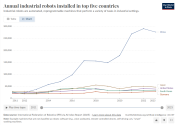I feel like China has an Iran disease. They keep wanting to compromise, they keep want to just be at peace when your enemy wants to utterly murder you. What US has been doing to China with the export controls is literally economic murder and China hasn't done anything proportional. This peace disease will surprise China again and again in this fight against US empire.
You do not understand something.
The Chinese are like that, because they view the American threats as being empty when it comes to China.
The American politician who is anti-China is using a barking dog strategy. There is no merit in that.
Simply put, China is not afraid of a barking dog, or afraid of the big bad wolf.
Who cares.
Furthermore, the recent American experience in Asia, the Korean War and Vietnam War, that still factors into calculations today.
It is what old man Nixon a long time ago. If we look around Indo-China, then we realize all our problems are sourced from China. Later, Nixon went to China.
We could say that today, if we look around the world, then we realize much of US problems has a strong China backing behind it.
Trump, unlike Nixon, did not seek completely peaceful terms with the Chinese with the trade war.
But, that is why I like President Trump.
President Trump does not use a barking dog strategy with China. He tries to bully but if that does not work, he backs off.
That is easier and more productive a leader to deal with, compared to Biden, Obama, or dubya Bush.

